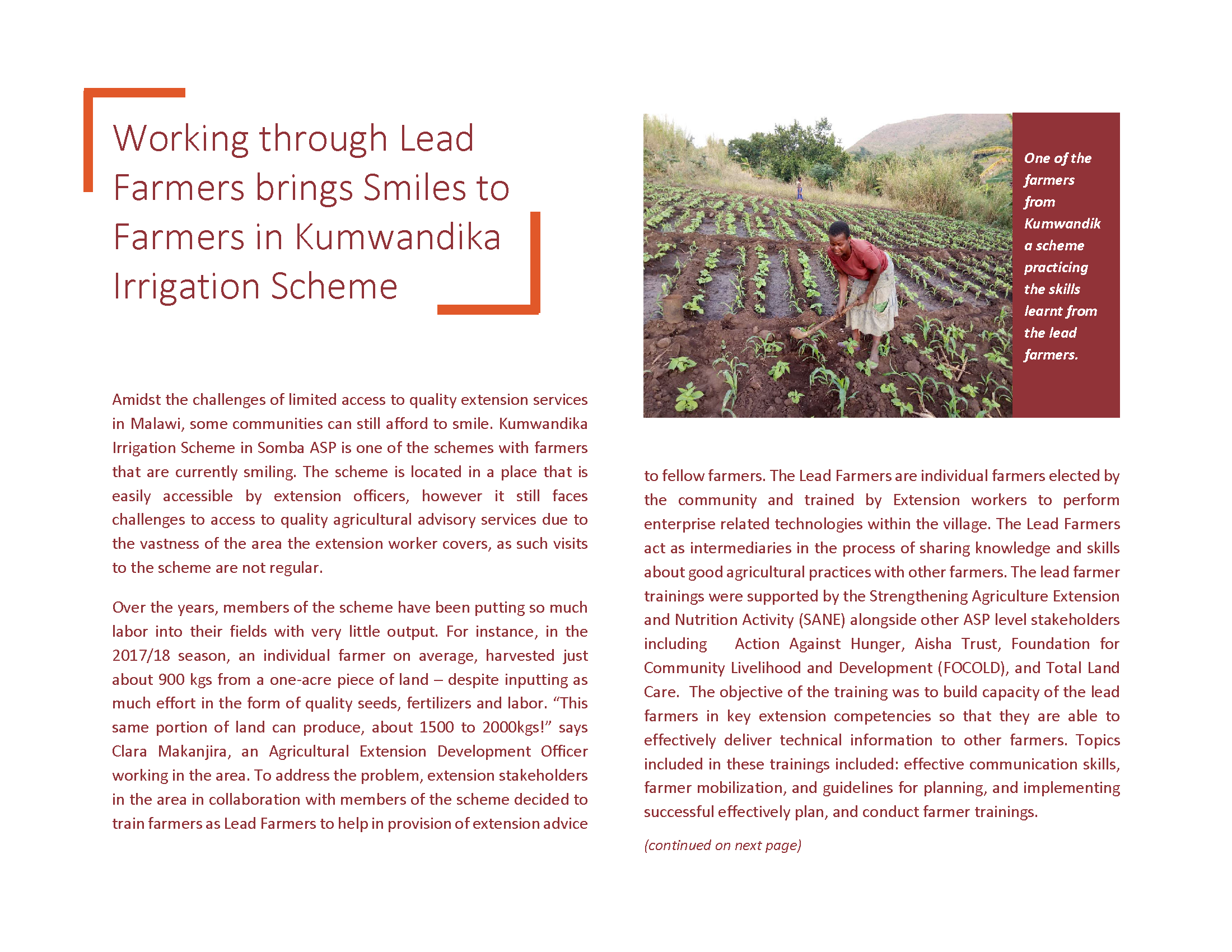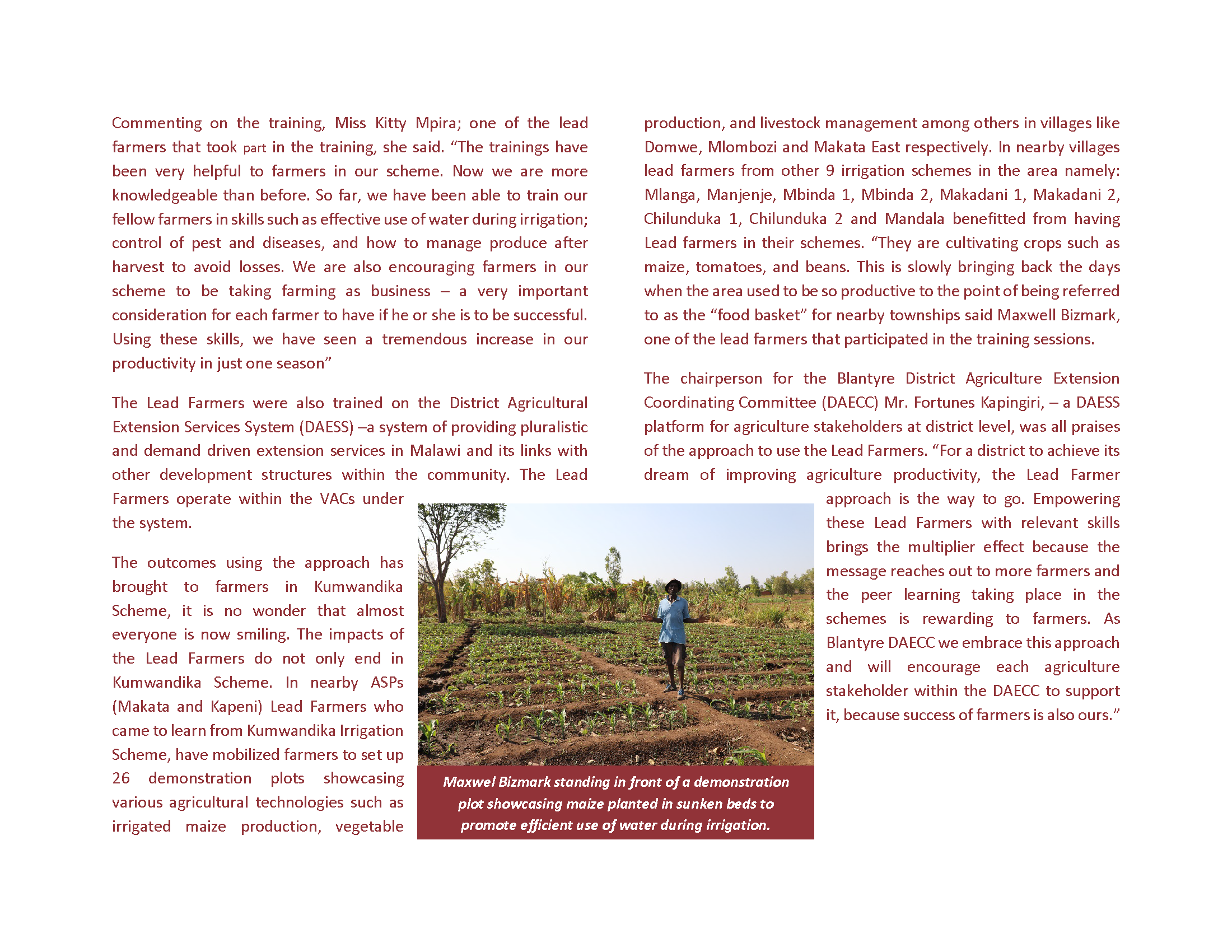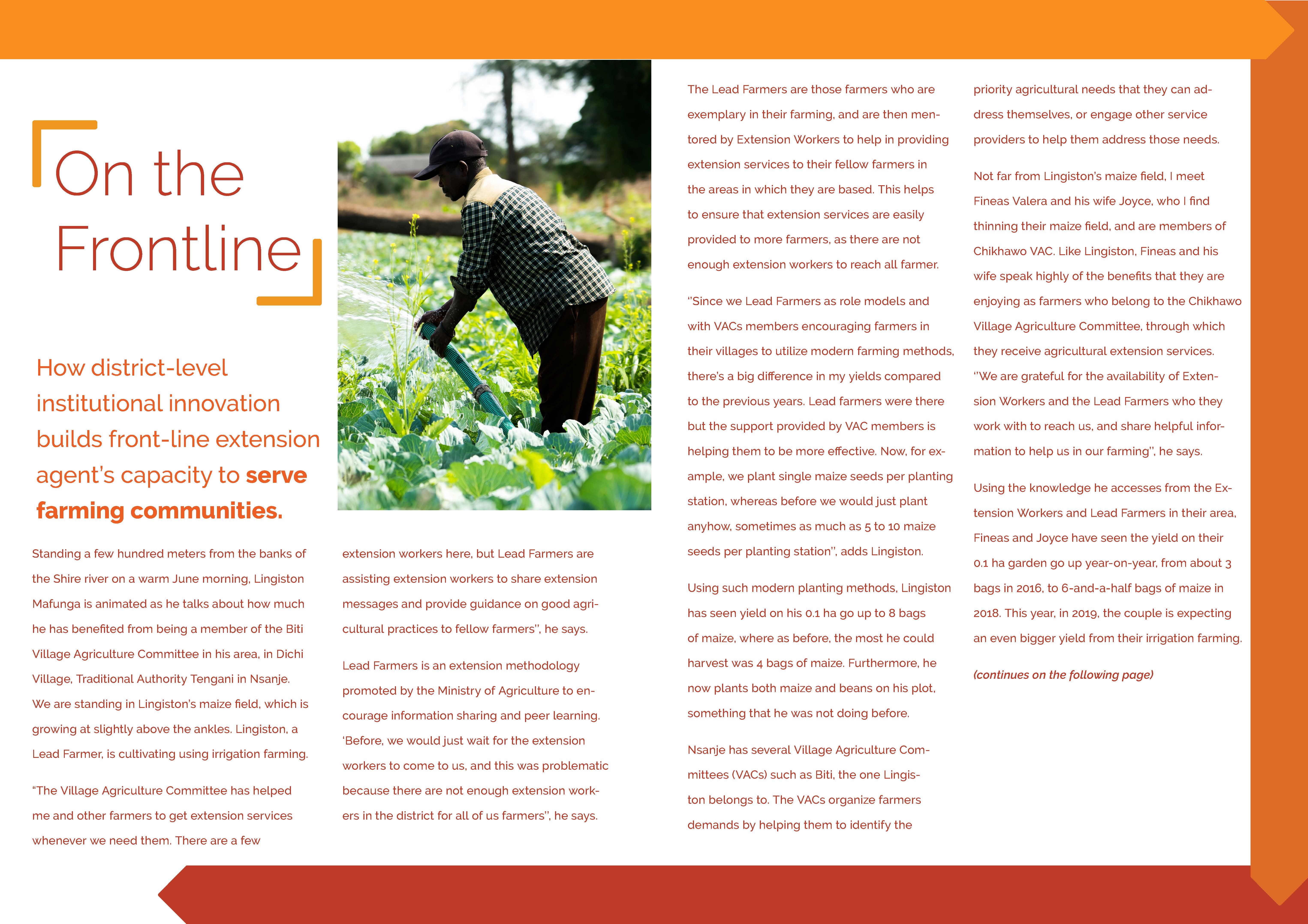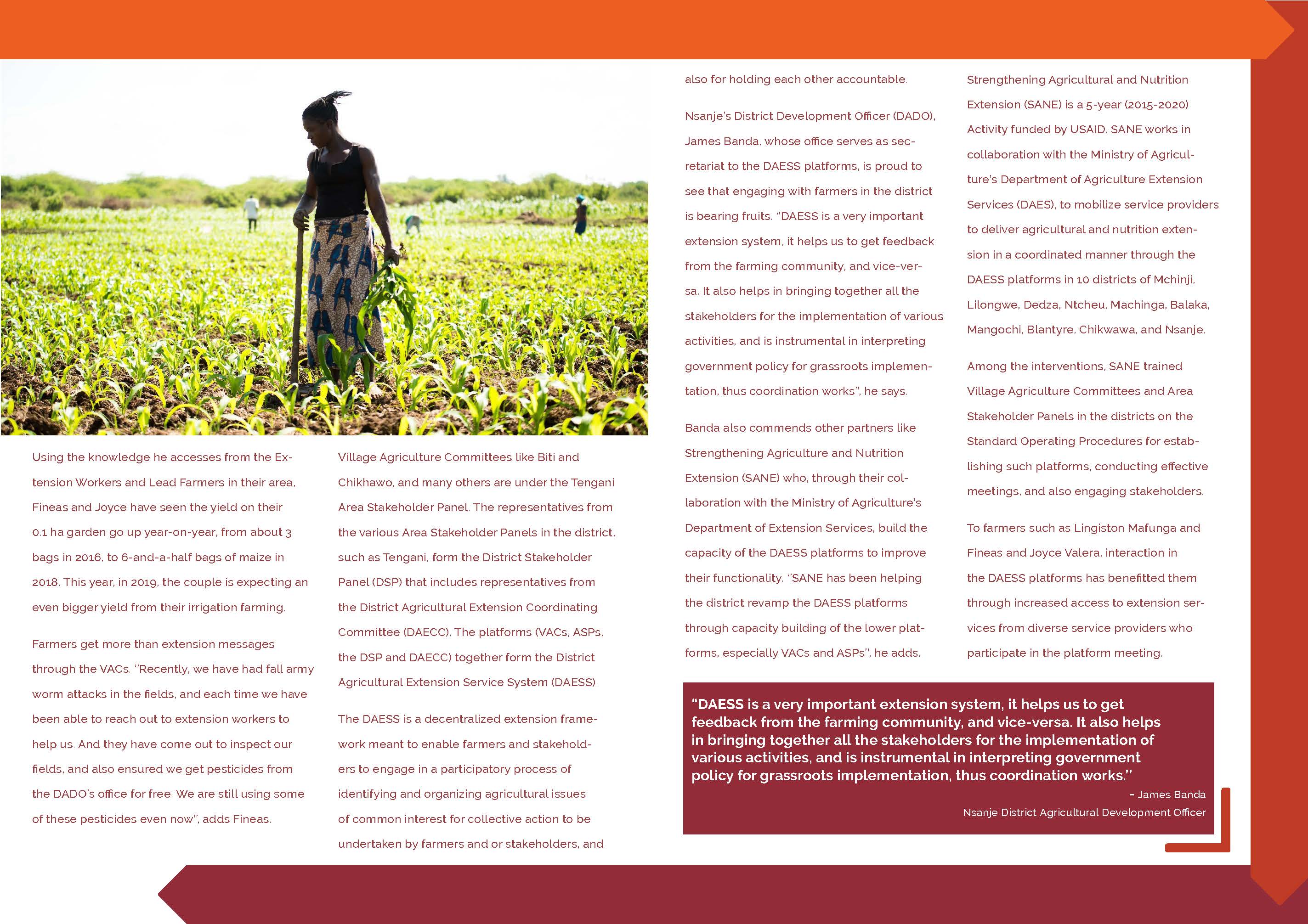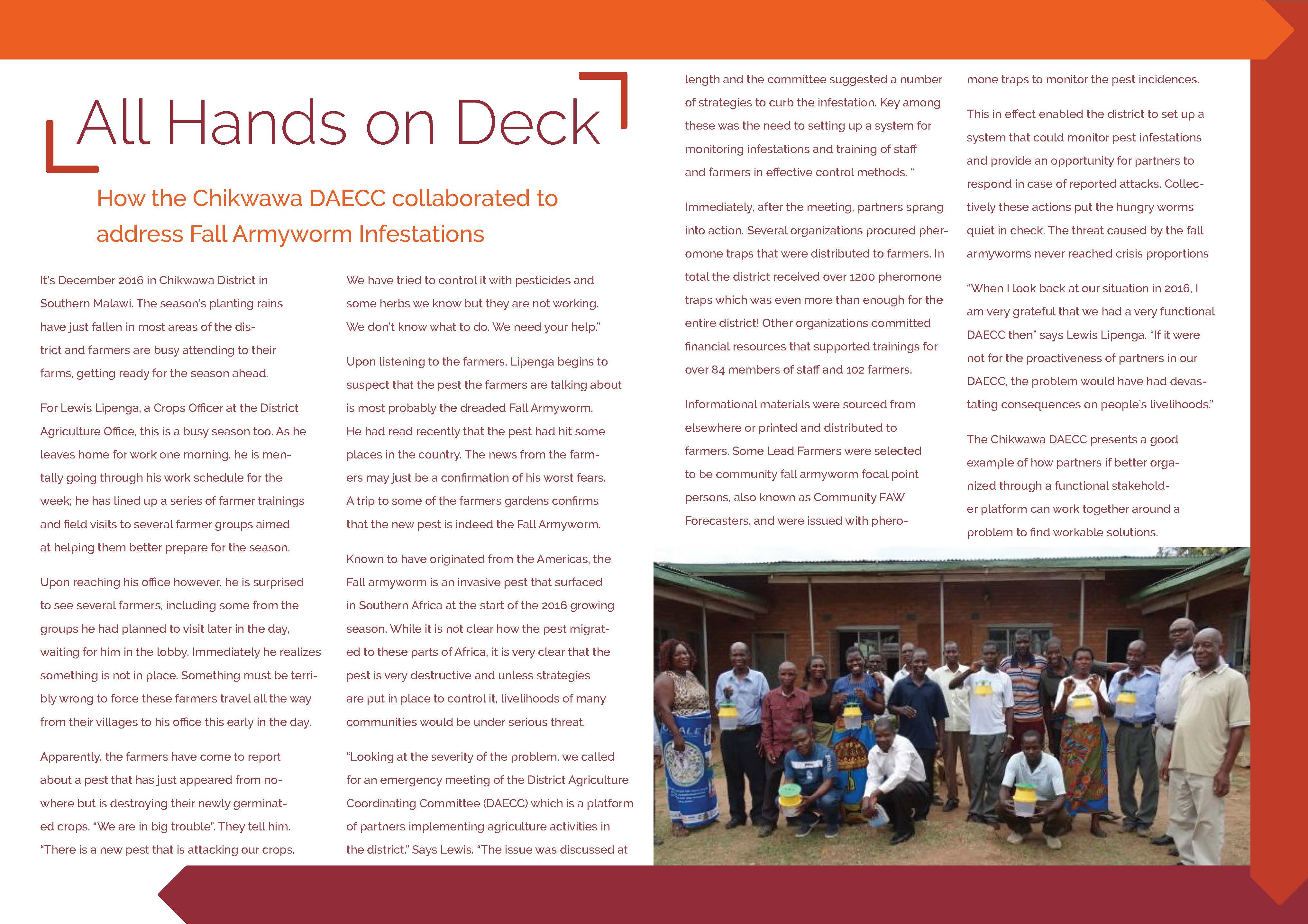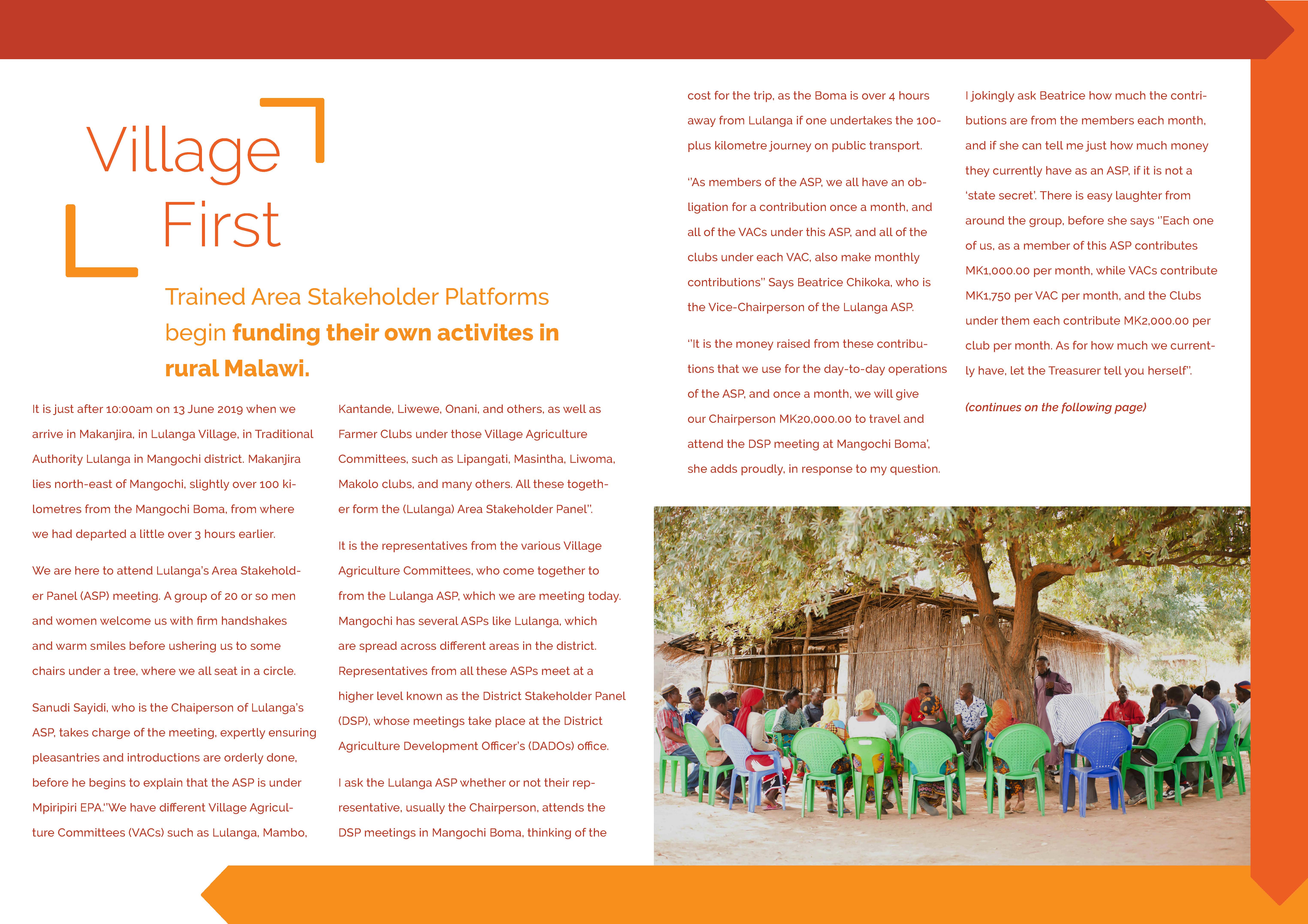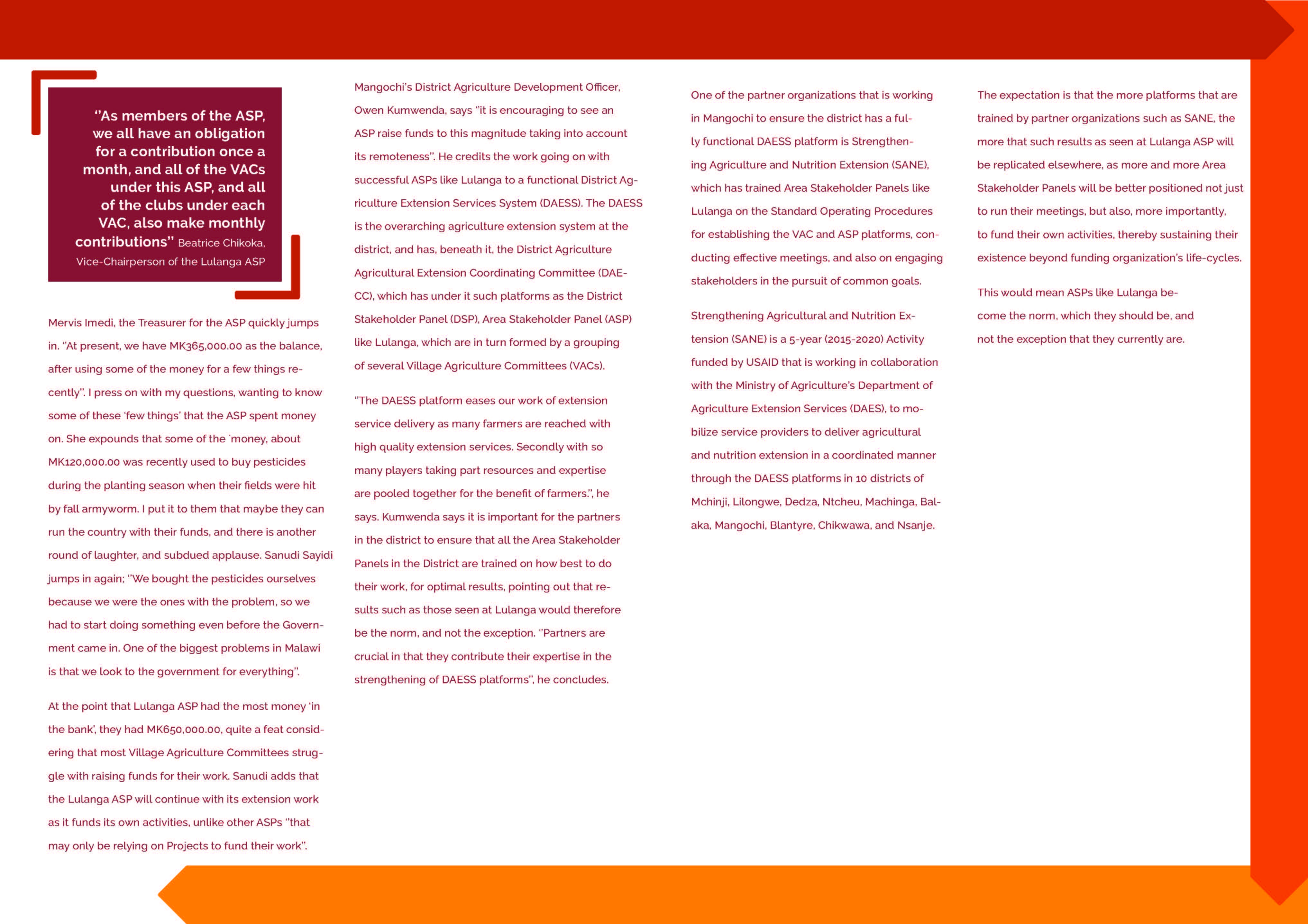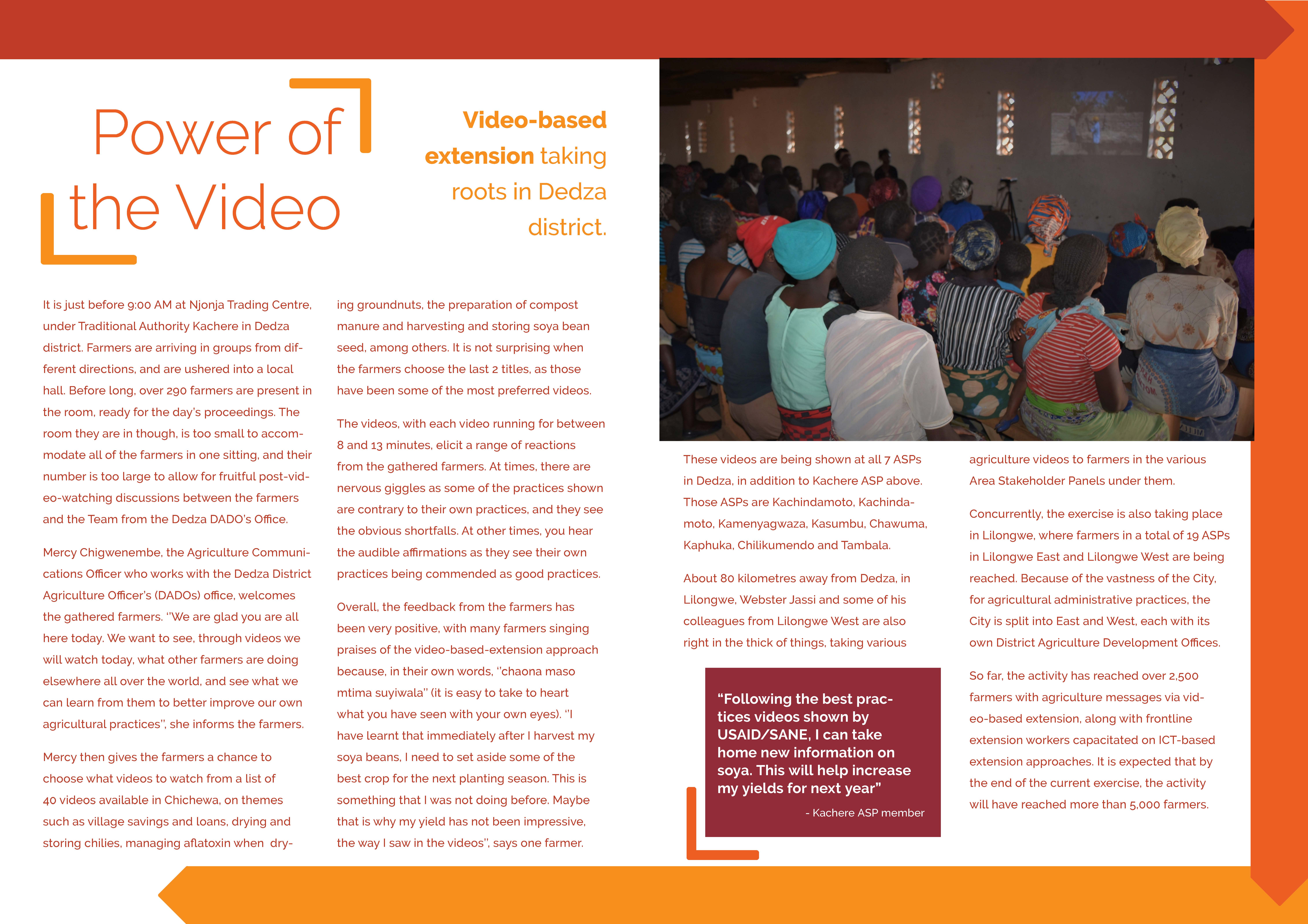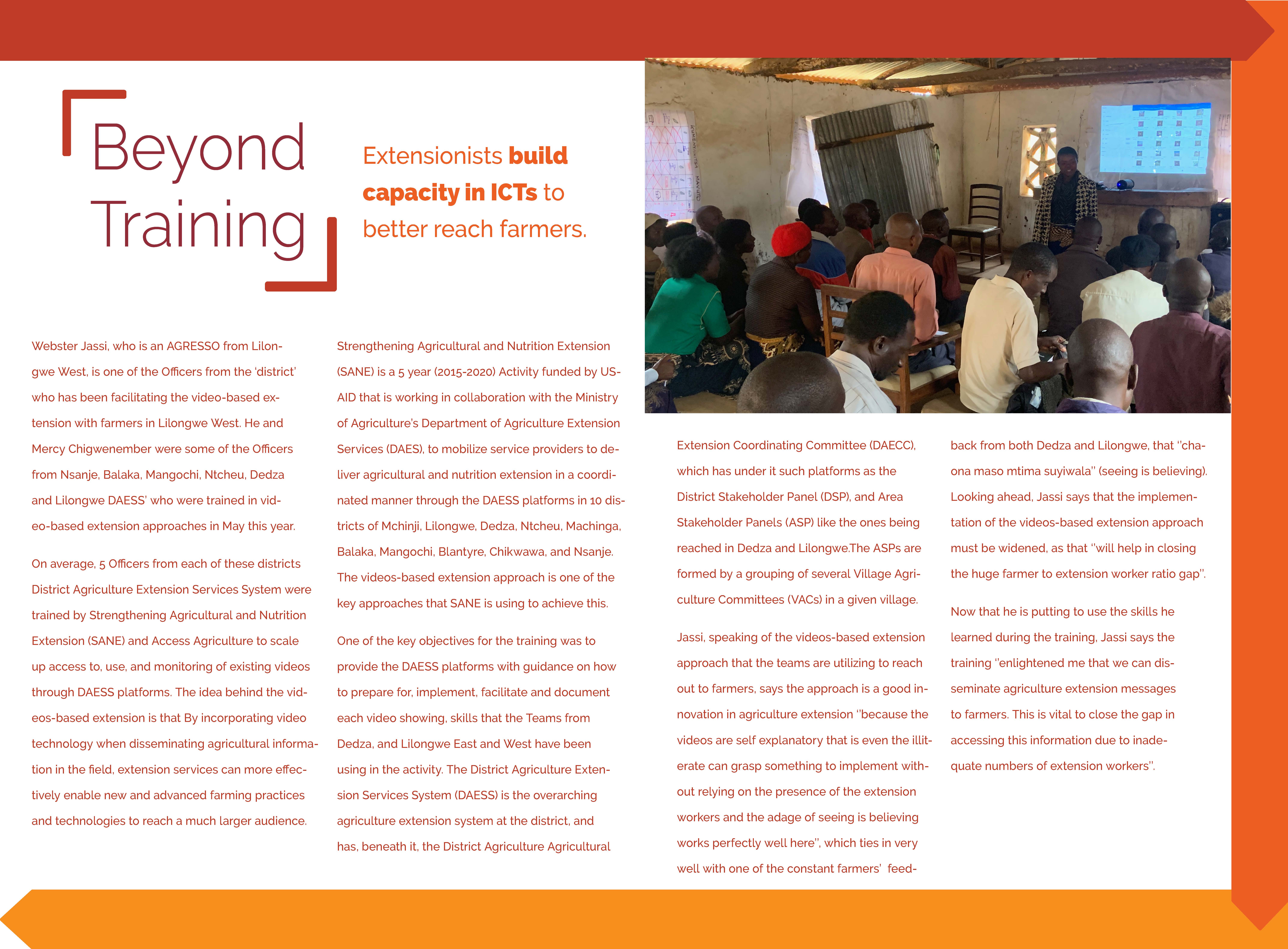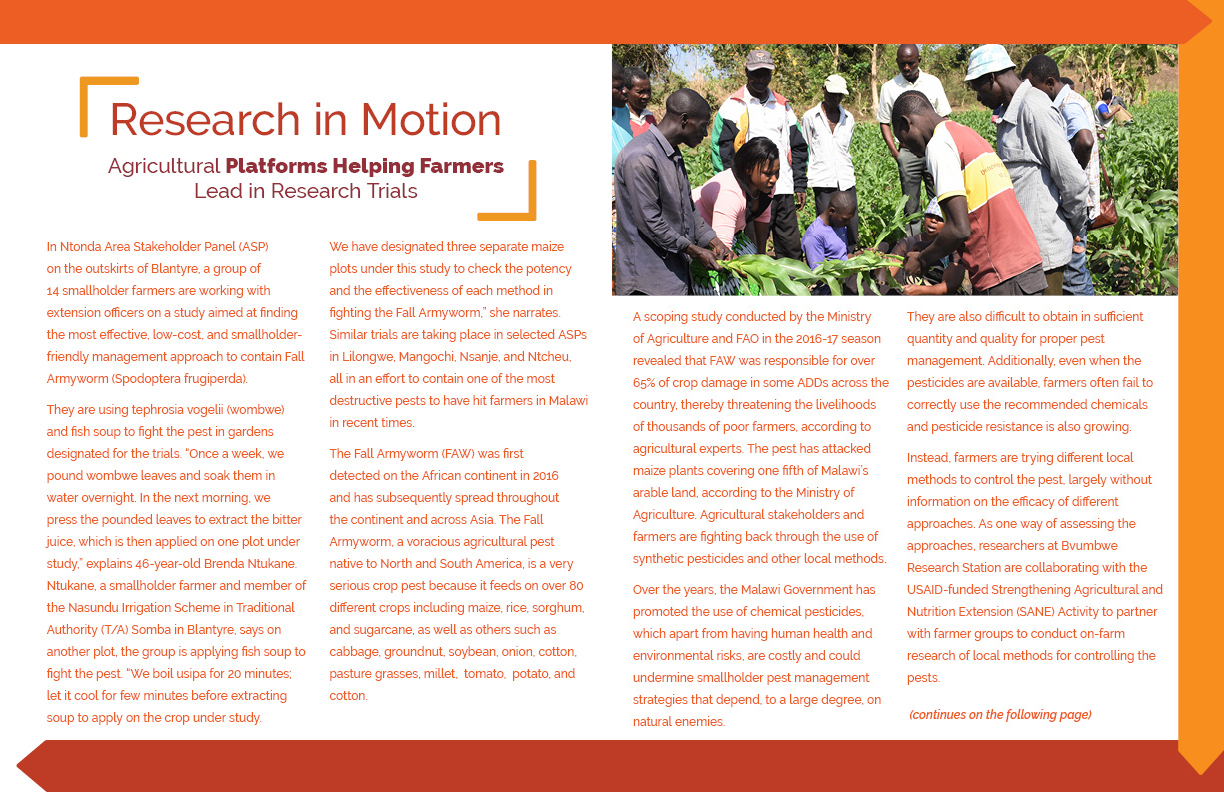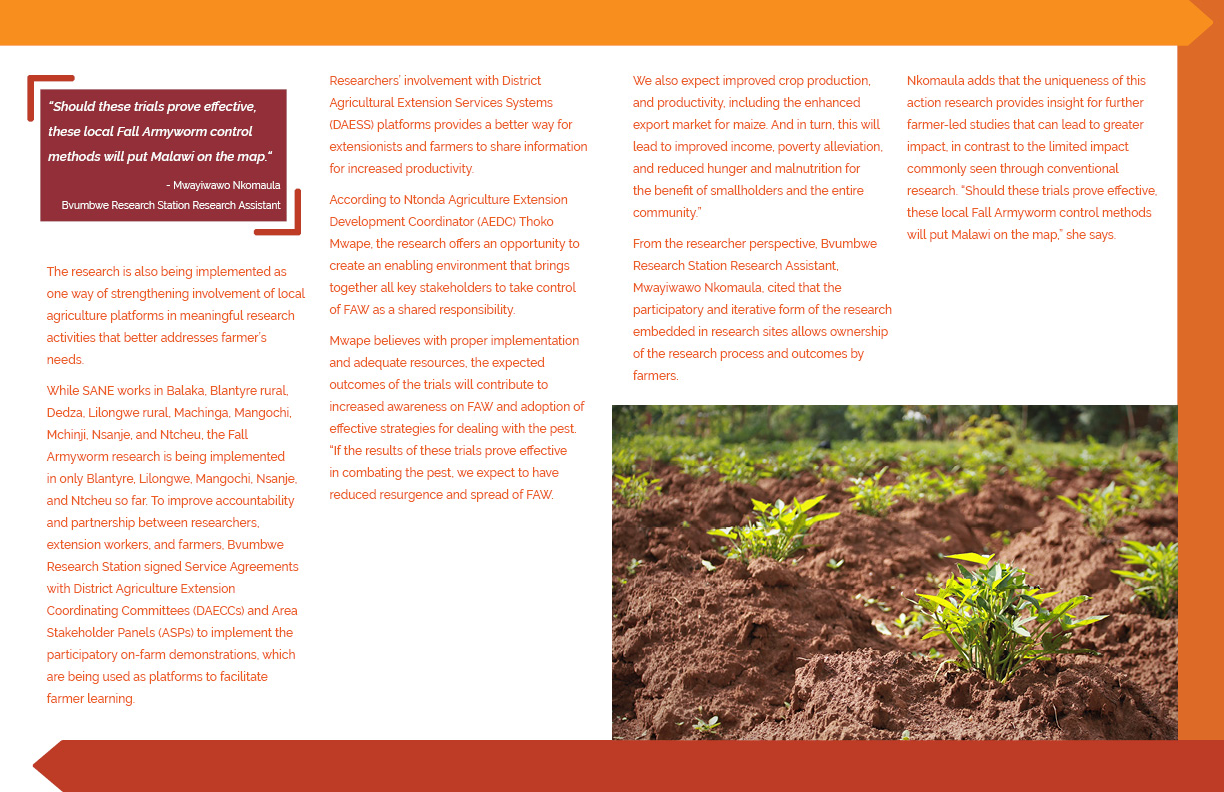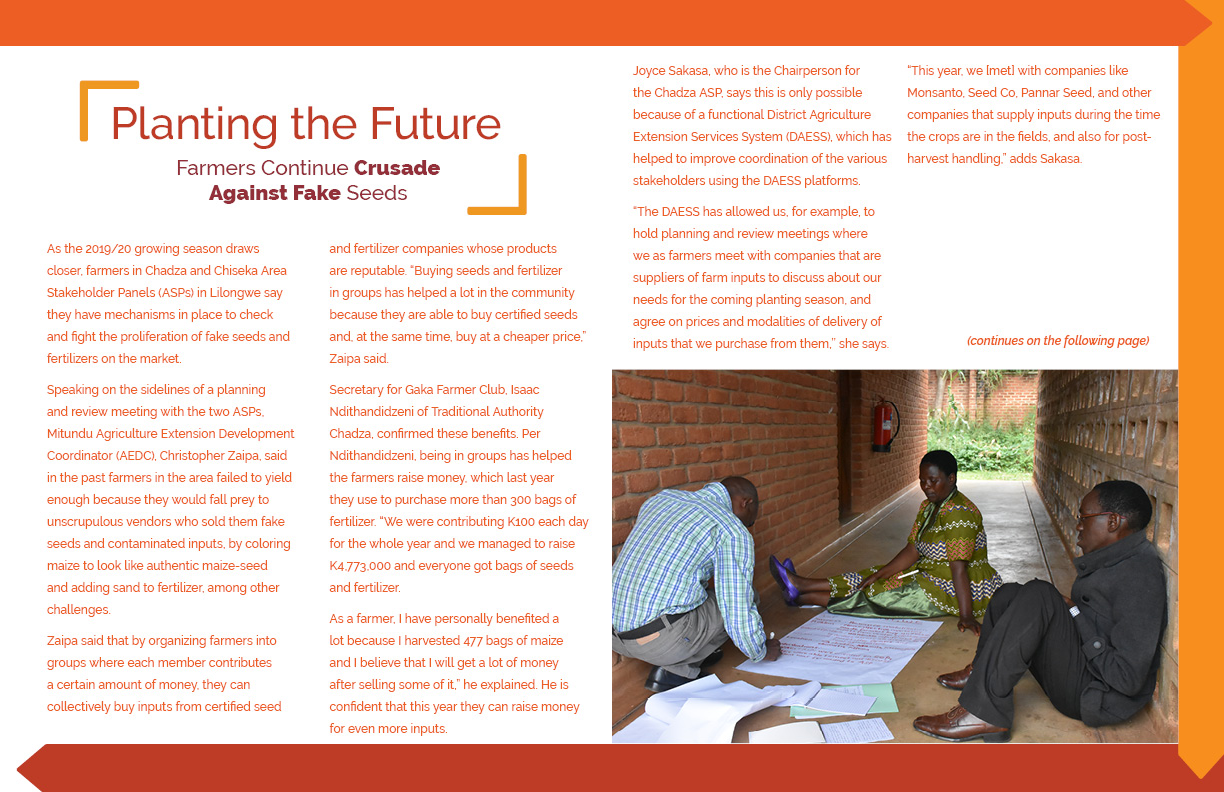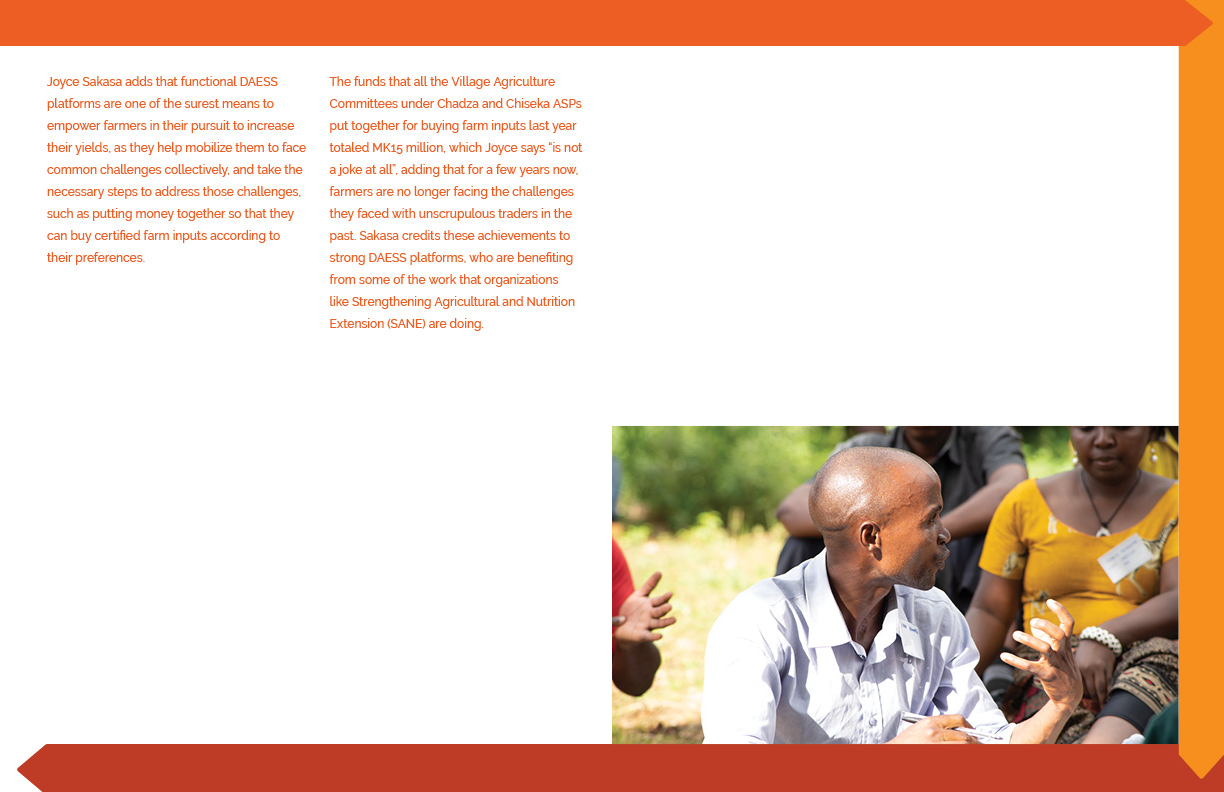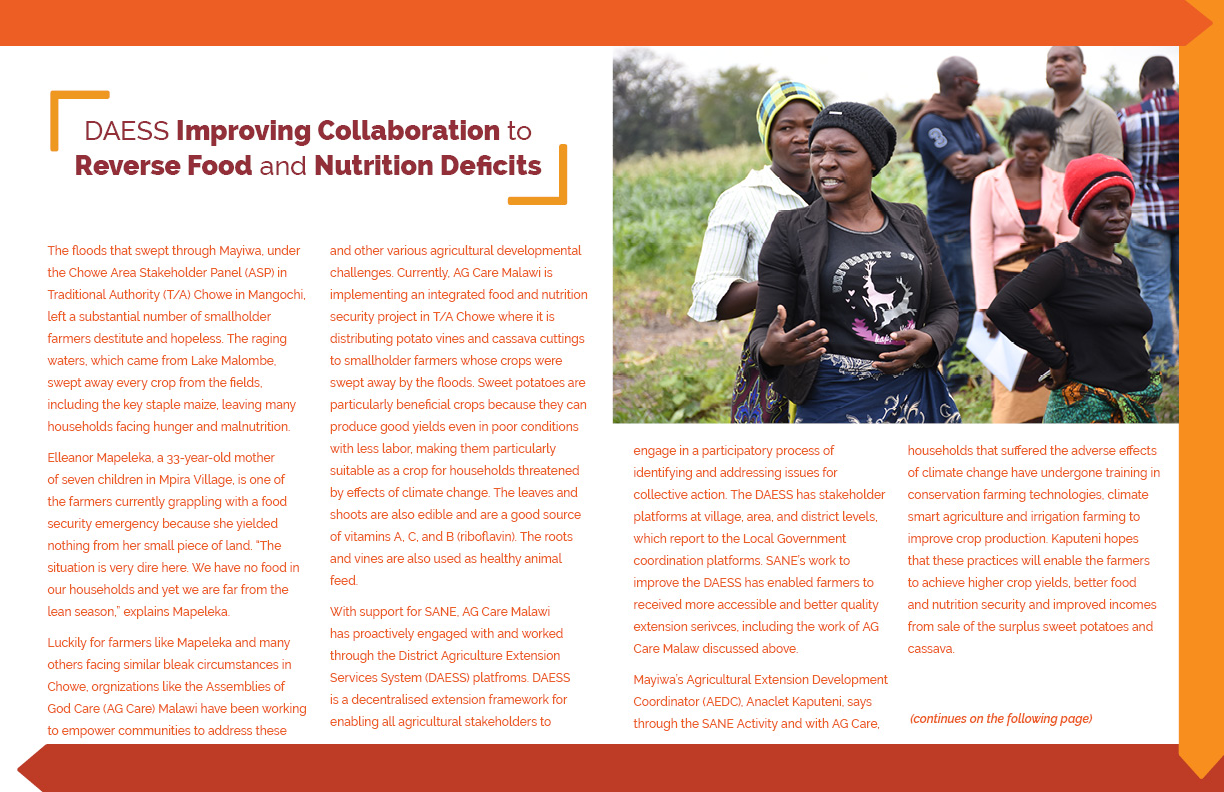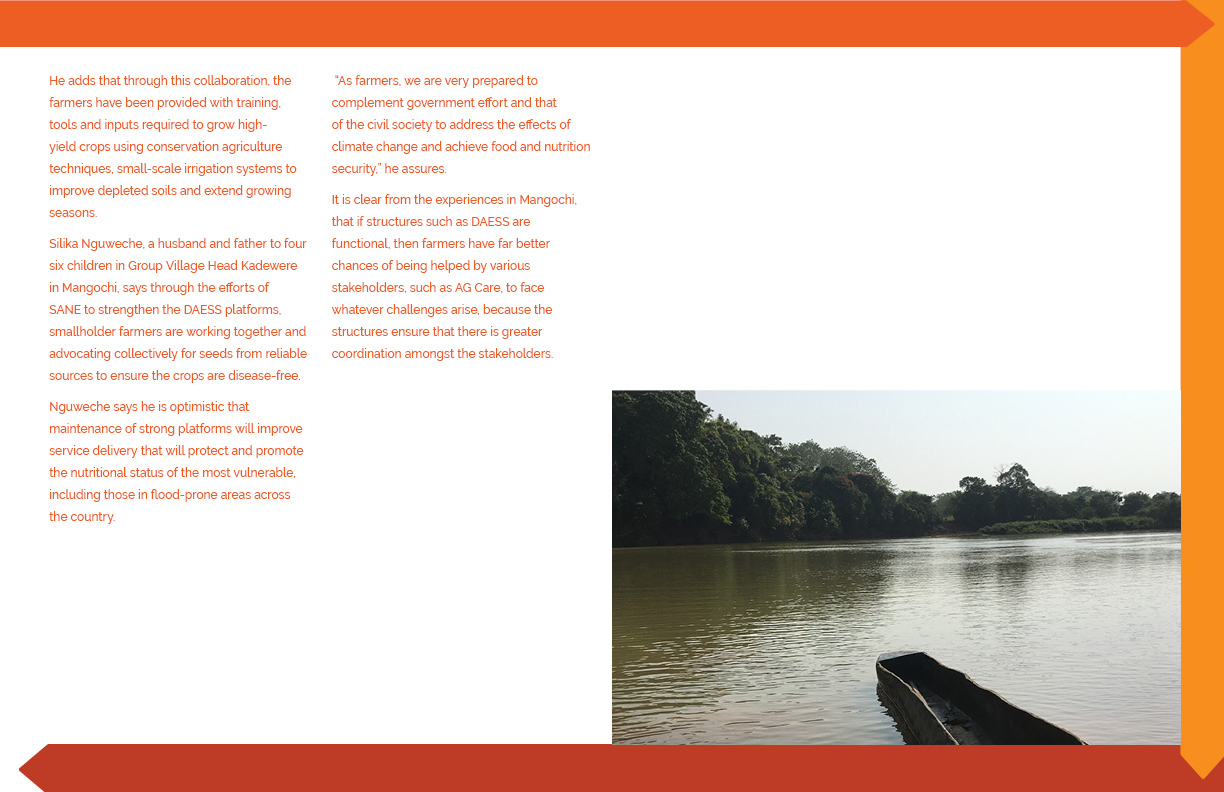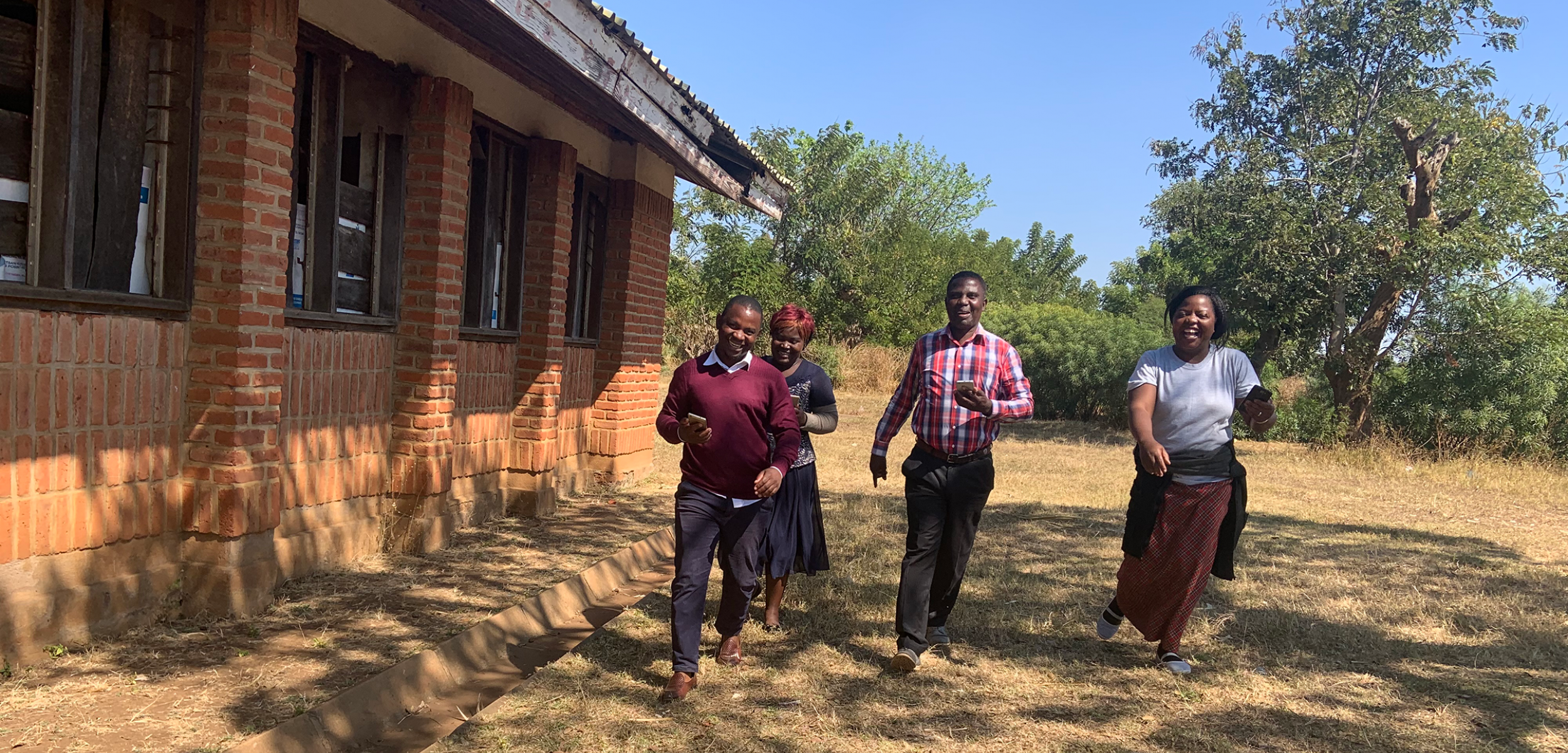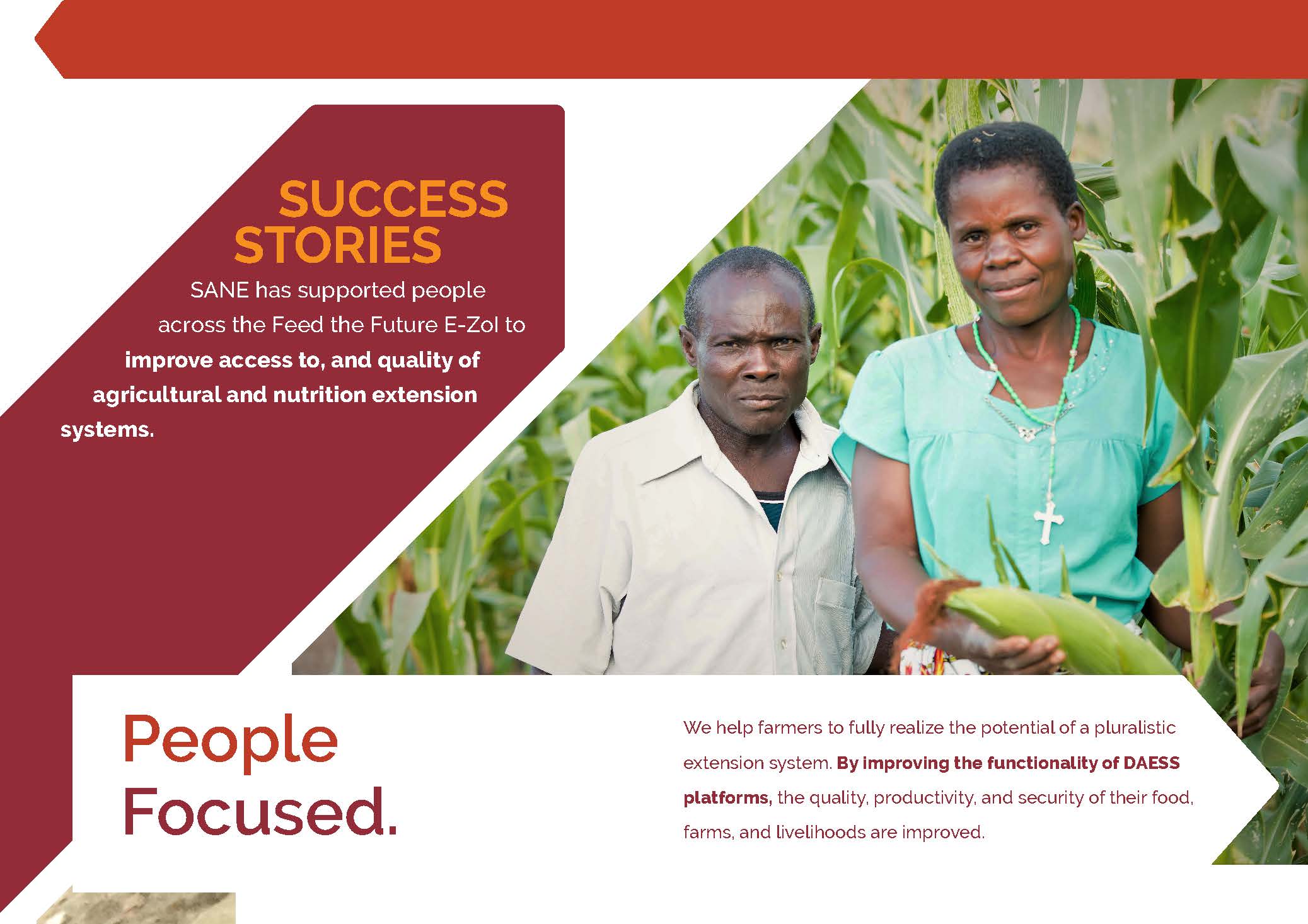Since SANE activities began in 2016, we have seen exciting progress towards improving access to agriculture and nutrition services in Malawi. As the project moves forward, it documents stories of success via improved policy environment for agriculture and nutrition, strengthened coordination -along with strengthened capacities- of actors within the extension system, and improved linkages between research institutions and extension service providers to better serve farmers. Browse below to read success stories centered around SANE's work in Malawi.
TECHNOLOGY PROVIDES OPTIONS: EXPERIENCES WITH E-MEETINGS IN EXTENSION AMID COVID-19 PANDEMIC
In March of 2020, the Malawi Government declared a state of national disaster due to the COVID-19 pandemic. The declaration mandated prevention measures to curtail the spread of the virus, including social distance, a limit to the number of people participating in events, handwashing with soap, and using alcohol-based sanitizers. For SANE, the virus hit at a crucial time in implementation of activities as SANE was working on intensifying the District Strengthening Action Plan (DSAP) implementation to intensify coaching of partners in DAES on system strengthening. Thus, working from home and restrictions on physical meetings affected the primary methods used to coach the DAECCs and ASPs. For SANE to maintain contact with the DAESS platforms and understand how extension is being provided during the COVID-19 period, adaptation and innovation were needed. SANE therefore introduced the idea of virtual meetings to all the 10 DAECC platforms. The response was as would be expected in any adoption process – excitement in some platforms, and skepticism and doubt in other platforms. For most districts, and for many platform members, this would be the first time they were participating in online/virtual meetings.
"With the Zoom Platform, it was easy for the convener to seek need for clarification or additions from the participants. Also, whenever a participant raised a hand, he or she could be easily identified and given the floor." - DAECC member participant from Blantyre
After thorough deliberations within the DAECC platforms, thirteen (13) DAECC meetings were arranged on Zoom to brainstorm which extension activities could still be implemented amidst the physical-meeting restrictions effected during the COVID-19 period. For the benefit of those who would be attending online meetings for the first time, SANE provided technical support by developing and disseminating Standard Operating Procedures (SOPs) for online meetings. With the DAECC Chairperson or a representative in the lead, each DAECC chose a person who had prior experience in online meeting platforms such as Zoom and Skype to help the Secretariat with the preparations for the meeting, as well as moderation during the meeting. Other responsibilities were also shared amongst those familiar with the platform tools, such as watching the chat box, recording the meeting to aid the note taker, and someone to take notes.
"This is exciting for some of us, as we have not used some of these platforms before. So we are also learning here, and this is one of the best ways we can be communicating even when we are far from each other." – Stater Magombo, Agribusiness Officer, Mchinji DAECC
To ensure participation of all members of the DAECC, SANE provided support for data bundles; that was well accounted for by ensuring that all participants were registered before the meetings and a rollcall was conducted at the start of each meeting. Fortunately, all the DAECC meetings were staggered throughout the week, making it easier for SANE staff to be on standby for logistical and technical support.
Most Secretariats used the first 30 minutes of the meeting to orient participating members on protocols for online meetings. For example, Balaka used the SOP that SANE developed to conduct orientation for the DAECC members a few days before the meeting. Though the idea of online meeting was initiated by SANE, Districts owned the meetings by soliciting additional agenda items from their members.
During the meetings, presenters were well equipped, Chairpersons controlled the floor well despite this being a learning process, and active participation was observed. Sharing the screen to ably follow previous minutes, presentation, and notes was one of the important skills that DAECC members learnt, especially as DAECC online meetings will likely continue in the current COVID-19 season. In Lilongwe ADD (Lilongwe, Dedza, and Ntcheu districts) some delays were experienced to kick-start the meetings due to little knowledge of the Zoom platform.
Despite some of the challenges experienced, the experience was worthwhile. All the 13 districts were able to discuss and document strategies to continue providing extension services while observing measures to prevent the spread of COVID-19.Experiences were also shared regarding what implementing partners are doing to continue to provide their servicessafely. For example, Nsanje DAECC lobbied for inclusion of agriculture extension activities in the district’s COVIDcontingency plans, whereas originally, the plans only had health-related activities.
Some organizations which are also part of the DAECC platforms were motivated to emulate the example set by SANE to support online meetings. “As MSIKA, we wanted to have a presentation in the past but was postponed due to COVID-19. I will now talk to my boss about the possibility of holding a virtual meeting in which the presentation could be made,” said a representative of MSIKA Project in Mangochi. “I really like the idea of virtual meetings,” he added. Farmers Union of Malawi also requested SANE to link them to Mchinji and Lilongwe DAECCs to present an upcoming project to the DAECC members.
"Thank you SANE for creating an enabling environment for DAECC to hold this meeting. As DAECC we appreciate that, and are encouraging stakeholders to support such efforts." – Owen Kumwenda, Assistant Chief Agriculture and Natural Resources Officer for Mangochi
"We will lobby from other stakeholders within DAECC to emulate SANE’s example and support subsequent meetings." – Hastings Yotamu, Director of Agriculture and Natural Resources, Lilongwe, speaking after the Lilongwe DAECC Meeting
In most districts the meetings took about 2 hours and the experience was appreciated. “We really appreciate the support from SANE. We will continue conducting such meetings to ensure coordinated implementation of activities in the district” said Joshua Mphanda, Dedza DAECC Secretary, after the district meeting.
Key Lessons:
- Sharing responsibilities: The online meeting platforms’ tools needed to be properly managed, so responsibilities were shared amongst the different members.
- Internet connectivity: There were also disruptions observed for some members due to intermittent internet. Members encouraged each other to ensure they are within areas with good internet connectivity during meetings.
- Advance downloading of the application prior to meeting: Some people experienced problems participating due to challenges encountered in downloading the application. For example, Ntcheu DAECC had fewer than 10 DAECC members instead of the planned 15 because some members failed to install the platform’s applications on their devices.
- Use of mobile phone: It is better to use a laptop rather than a phone, as one can easily share their screen with the other participants, and one can also easily see a shared screen. A phone’s display is usually very small for someone to effectively see what is being shared. Using a laptop or tablet was more appropriate in such situations.
COLLECTIVE MARKETING BEARS FRUITS ONCE AGAIN IN LOWER GANYA ASP
Identification, analysis and organisation of farmers’ felt demands is one of the core coordination functions of Area Stakeholder Panels (ASPs). Despite this, some farmers across ASPs still face various challenges including low prices for their agricultural produce.
This marketing gap remains a top challenge as evidenced by farmers’ feedback during monitoring visits. “We toil throughout the year only to be duped by unscrupulous vendors who offer low prices for our agricultural commodities,” is a sentiment that is commonly expressed by farmers across various ASPs.
In Ntcheu district’s Lower Ganya ASP, such challenges are steadily being addressed. Since 2017, through efforts by the 23-member platform, a total of seven soya farmers in the ASP were organised and aggregated 3 tonnes of their produce and sold it through the Auction Holdings Commodity Exchange (AHCEx), one of Malawi’s leading commodity markets that links buyers and sellers of Agriculture produce.
The initiative was reported at a District Stakeholder Panel (DSP) meeting and was subsequently discussed during District Agriculture Coordination Committee (DAECC) meetings. “We were really impressed with the coordination efforts by the ASP and were therefore left with no choice but to respond to their demands by linking them to better and more organised markets,” said Charles Tepeka, Ntcheu DAECC Chairperson.
In collaboration with SANE Activity, Ntcheu DAECC approached AHCEx, to explore the possibility of the farmers selling their produce through the company.
The discussions between the DAECC and AHCEx were successful and led to farmers selling their produce to National Smallholder Farmers of Malawi (NASFAM), fetching close to MK750,000.00 using a warehouse Receipt System. The system allows farmers to deposit their commodity at the AHCEx warehouses where a receipt is issued. Such an arrangement enables farmers to sell the commodity at a time when prices are favourable to them. In addition, the farmers can access loans using the receipt as collateral.
Joseph Chimangeni, Chairperson of Lower Ganya ASP and one of the beneficiary farmers, revealed that the returns were far better than what community vendors were offering. “We really thank the DAECC members for the assistance, because NASFAM bought the produce at MK250/kg compared to the less than MK200/kg that vendors were offering,” he said.
Following the successful story in 2017, twenty-three more farmers from five VACs2 under the Lower Ganya ASP joined the initiative, bringing the total number of farmers to thirty. However, due to availability of multiple markets, the farmers, with assistance from the ASP decided to change the marketing approach during 2019/2020 marketing season. On behalf of the farmers, the ASP engaged Chumachilimunthaka Association which bought the aggregated soya within the ASP.
Forty-five metric tonnes were sold at MK245/kg with each farmer selling an average of 30 bags of soya. The ASP secretary indicated that farmers decided to change the approach to reduce other costs associated with their selling the soya, including transportation. “We advised the farmers to weigh the available market outlets before making a final choice by factoring in all the costs associated with marketing of their produce,” said Alfred Mbewe, Secretary for the Lower Ganya ASP.
Brave Kaunda, one of the farmers who sold his produce to the Association in 2020, testified to the successful initiative. He explained that before 2017, unscrupulous vendors used to reap from their hard work by buying their produce at very low prices while also using non-standard scales. He indicated that the new marketing approach was benefiting farmers by improving their livelihoods. “I bought two goats and a host of local chickens from the proceeds after selling to the Association, something I could not manage previously. I am now motivated and will increase my soya hectarage for the 2020/2021 season,” he added.
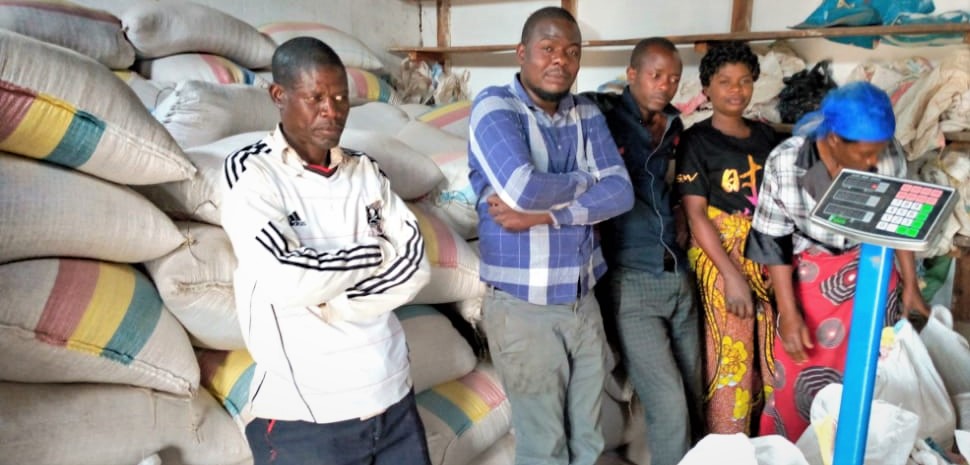
Lower Ganya ASP members sorting out the soya they sold to Chumachilimunthaka Association in 2019/20 harvesting season.
Moving forward, the ASP plans to mobilise more farmers to join the initiative, procure their own weighing scales, diversify to other commodities like sunflower and search for more marketing options.
In addition, the ASP aspires to be a model DAESS platform for improving farmers’ livelihoods by assisting them in identifying, organising and communicating their marketing needs.
STRENGTHENED MACHINGA ASPs DELIVER IMPROVED LIVELIHOODS
Ethel Matiki, a 37-year-old mother of 5 children, shares a story that is a familiar experience for many women from Kamlinje Village, in the area of Group Village Head (GVH) Kamlinje in Machinga district. Like others in the village, her story has been characterized by perennial food shortages replete with lack of other basic needs to sustain her household’s livelihoods.
As a single mother, Ethel has been one of the victims hard hit by the effects of seasonal droughts, a monster that ate into her storage reserves. “Climate change has been our worst nightmare here, I barely get enough from my one hectare of land,” she said. What her area, which falls under Nkoola Area Stakeholder Panel (ASP), needed the most was an irrigation scheme. Irrigation farming was one of the few untried options which the community had to fight food insecurity.
It was, however, not easy for community members to get organized and demand such a service, as many members did not know the roles and responsibilities of an ASP in demanding services.
The turning point was a capacity building intervention for Nkoola ASP which was conducted by SANE, and led to the revamping of the committee by training them on their roles and responsibilities. This strengthened Nkoola ASP members to be able to demand provision of irrigation infrastructure from development agents.
Project Concern International and Emmanuel International were approached based on the proceedings of one of the ASP meetings in 2017, and the two organizations pledged to help with the challenges the farmers were facing. The result was the construction of dams and provision of irrigation material like treadle pumps to the farmers.
The coming of the Mangulu and Msomwa irrigation schemes, which were established towards the end of 2017, is greatly benefiting Kamlinje, Chikhwita, and Ngunga VACs, as most households in the area are now able to have enough food throughout the year.
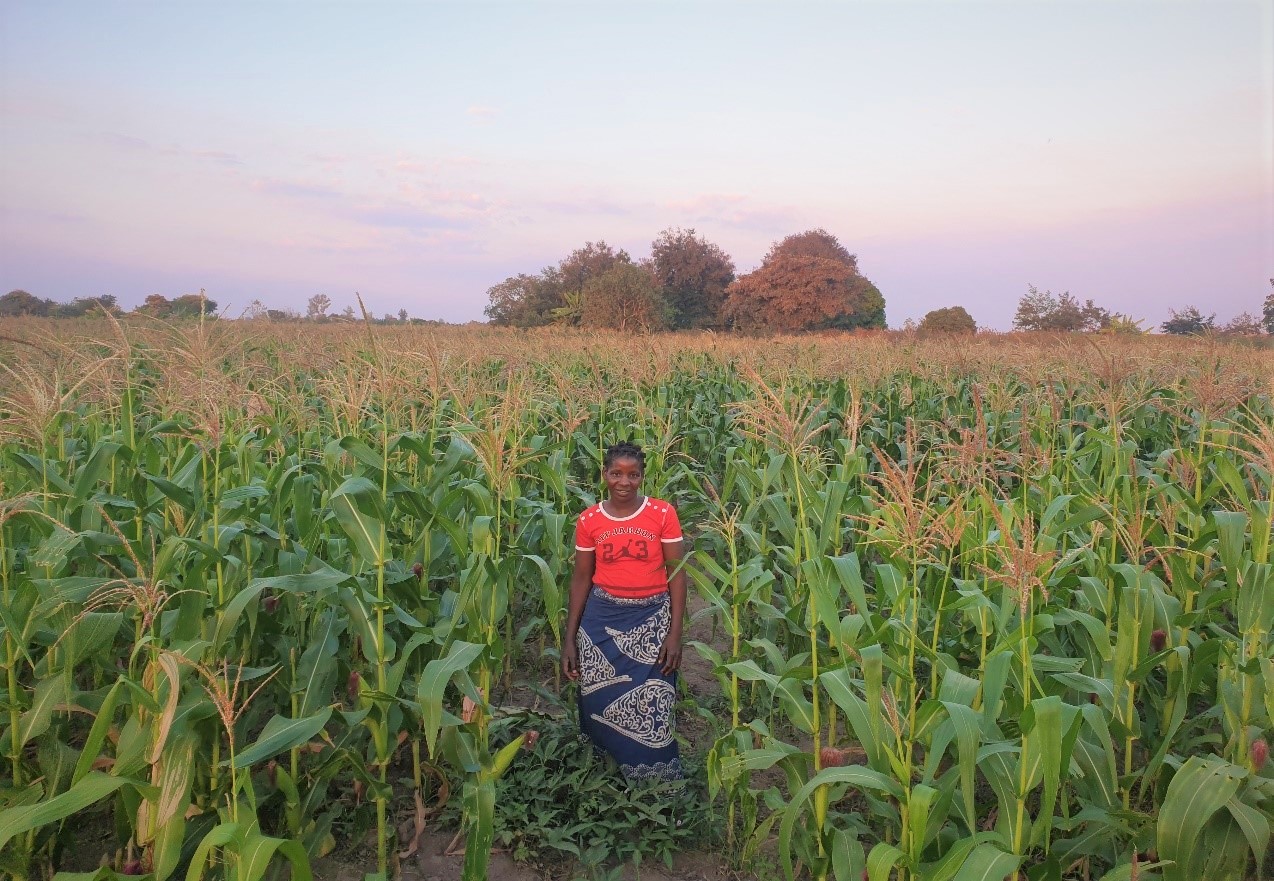
Ethel Matiki, Farmer under Nkoola ASP enjoying the benefits of Mangulu scheme
“Without the scheme I used to have insufficient food and I was lacking some basic household needs. I am now able to make over MK200,000.00 in sales from the harvest of the crop from the scheme, which is enough to feed my household of 7 members and support other household basic needs,” said Ethel Matiki who is also a member of Nkoola ASP, from Kamlinje VAC.
Her remarks were echoed by Mustafa Sapangwa who is the Chairperson of Mangochi District Stakeholder Panel (DSP), and is also the Chairman of Nkoola ASP. “Indeed, the scheme is now benefiting many members of the ASP. If these challenges had not been presented to the stakeholders who helped through the ASP nothing could have been done since PCI and EI were at first just working with the ADC in the area,” he said.
The ASPs in the district have become instrumental in demanding services that are improving the livelihoods of their communities, and Nkoola ASP is not an exception. Kawinga ASP, for example, demanded the supply of irrigation materials (treadle pumps) in the area. “The lack of the treadle pumps led to unnecessary costs in borrowing of the irrigation materials,” said Alice Gonthi, who is the Secretary for Kawinga ASP.
Seeing the gravity of this challenge, members of Kawinga ASP didn’t just stay idle, but presented the issue to CADECOM, which is one of the extension service providers in the area. The result was that CADECOM donated three treadle pumps to Nankuyu Irrigation Scheme which comprises members of Nyumwa VAC and four treadle pumps to Magomero Irrigation Scheme which caters to members of Chibwana VAC.
“This donation could not have been possible without members of Kawinga ASP demanding such services through their platform,” said Alice, who is also the Acting AEDC of Nanyunbu EPA in Machinga, before adding that “farmers from Nankuyu Scheme1 and from Magomero Scheme2 are benefiting from these denotations.”
It was not long before the farmers from Nankuyu Scheme started to see the fruits from their labor as they began harvesting produce from their fields, which led to new challenges – the lack of markets where they could sell their produce.
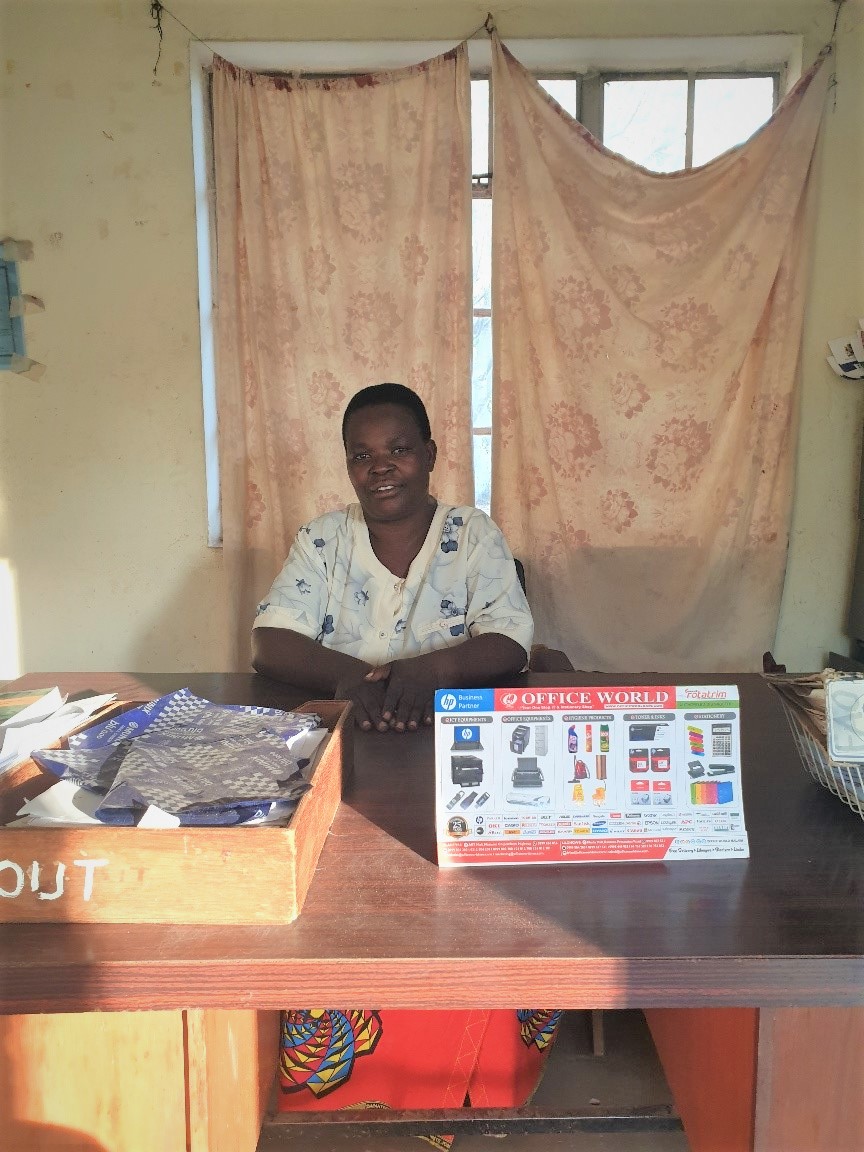
Alice Gonthi, Secretary of Kawinga ASP
This challenge was also presented to Kawinga ASP, through which ADRA intervened by providing training on markets identification to members3 of Mpapa Cooperative, which also comprises members of Kawinga ASP.
With the skills gained from this training, community members are now able to secure markets for their produce, such as groundnuts, pigeon peas, rice, and maize. Through Adventist Development and Relief Agency’s (ADRA) initiative last year (i.e. 2019), the cooperative now has a contract with Nandolo Association which buys some of their produce, and also another contract with ICRISAT on seed multiplication, leading them to earn high profit from the sales.
“This was a unique venture since the cooperative initiated this; it was the cooperative demanding support from ADRA”, said Belinda Chimombo, who is the District Coordinator for ADRA, and is also the Machinga DAECC Chairperson.
ADAPTING PROVISION OF EXTENSION DURING COVID-19 PANDEMIC
Agriculture Extension is one of the many areas of development that has been affected by the COVID-19 pandemic. At a time when the COVID-19 virus continues to spread across Malawi, farmers are increasingly finding it difficult to access extension and advisory services as Government Departments and District Councils continue to recommend more restrictions against group meetings and encourage staff to work from home.
These measures are likely going to negatively impact productivity for many farmers, thereby exacerbating poverty and hunger among vulnerable communities. The dilemma in this COVID-19 pandemic is the fact that farmers still need the services of the extension workers to advise on good agricultural practices, how to access and effectively utilize inputs and how to better market their produce.
“The COVID-19 prevention measures are coming at a time when farmers need extension services the most. This is the time when farmers have to harvest their crops, secure the harvest from pest damage, engage in marketing of produce, and engage in winter production,” said Henderson Chikanaulanga, Chairperson for Ntchisi DAECC, when asked how the COVID restrictions would affect farmers in the district. He added that “There is certainly need for agriculture stakeholders to think of solutions to ensure that services are not interrupted."
For SANE, ensuring that interactions between extension workers and farmers continue during these difficult times remains a key focus area. One strategy SANE has used is to engage the District Agriculture Coordinating Committees in all 13 districts it operates to consider utilizing online platforms like Zoom, Skype and WhatsApp to convene and conduct their DAECC meetings.
The meetings enabled the DAECCs to review strategies that can help in ensuring that service provision is not interrupted and to also come up with safety measures for stakeholders to follow when conducting extension work at community level.
Some of the measures proposed included suspension of activities or events that attract many people, minimizing the number of people coming to physical meetings, and putting in place recommended COVID-19 prevention measures such as setting up handwashing stations during farmer meetings, observing social distancing, and conducting meetings in open spaces.
“With the restrictions brought about by COVID-19, we were not sure how our DAECC would be operating. How would the DAECC fulfill its role of strengthening coordination without stakeholders meeting? The idea of using online platforms to conduct DAECC meetings was very brilliant. So far we have been able to meet online several times and discuss pertinent issues regarding coordination of extension activities in our district,” says Mphatso Mbulukwa, Chief Agriculture Officer (CAO) for Blantyre District.
At field level, some field staff have already readjusting their way of working and employing the prevention measures proposed during the online meetings, along with other measures recommended by the Ministry of Health.
For example, in Ntchisi some staff from NASFAM recently conducted trainings for farmers on marketing skills at ASP level using the COVID-19 preventive measures as recommended during the Ntchisi DAECC online meeting.
The trainings were conducted successfully, albeit reaching fewer numbers of participants than was originally planned. “We made sure that COVID-19 prevention measures were in place and strictly followed during the trainings. We invited fewer farmers to the trainings, put up hand washing stations and insisted that participants always observe social distancing. The topics covered also included a general discussion on COVID-19 led by a community health worker focusing on how the virus spreads and what one can do to avoid contracting it. This helped the farmers to better understand why the preventive measures were necessary,” said James Mkokoko, an Association Field Officer for NASFAM in Ntchisi.
Farmers from Vuso Jere ASP from Ntchisi observing social distancing during a training.
A similar approach was also followed in a district level training on Kumu Mapping for selected DAECC members in Nsanje, where the training was conducted in a well-ventilated spacious room, with participants sitting at least two meters apart. On top of washing hands with soap and disinfecting their hands with alcohol-based sanitizers, participants were also given cloth masks to wear during the sessions.
From the look of things, it seems that the COVID-19 pandemic may continue a while longer, so mainstreaming COVID-19 prevention measures into extension work is a critical component of programming that must be followed by every extension stakeholder if farmers are to continue benefiting from extension services.
As the country continues to record increasing numbers of new infections, it is likely that the Government might enforce even stricter COVID-19 preventive measures that may disrupt provision of extension and advisory services even further. It is therefore important that extension stakeholders start to become more innovative in coming up with strategies to ensure continued services.
“We really need to be innovative in coming up with strategies that will enable us to offer advisory services to farmers during this period,” says Chikanaulanga, before adding that “perhaps this is the time we focused more on use of ICTs for extension provision on top of other strategies proposed during the DAECC meetings.”
